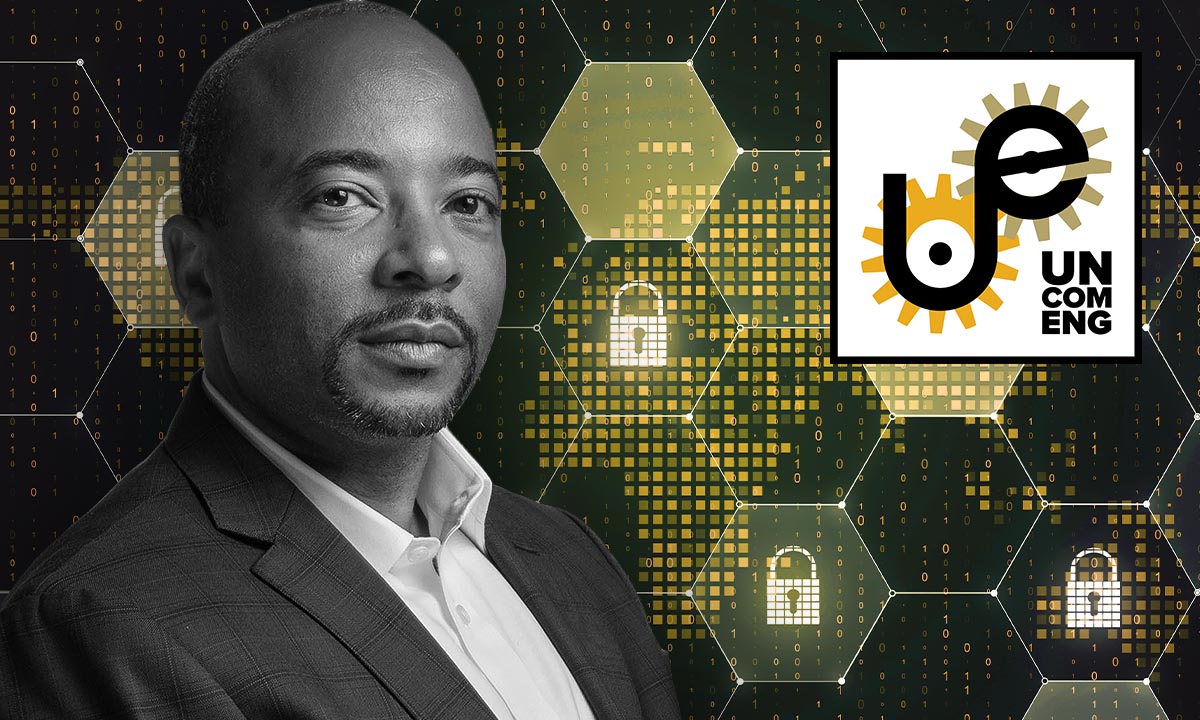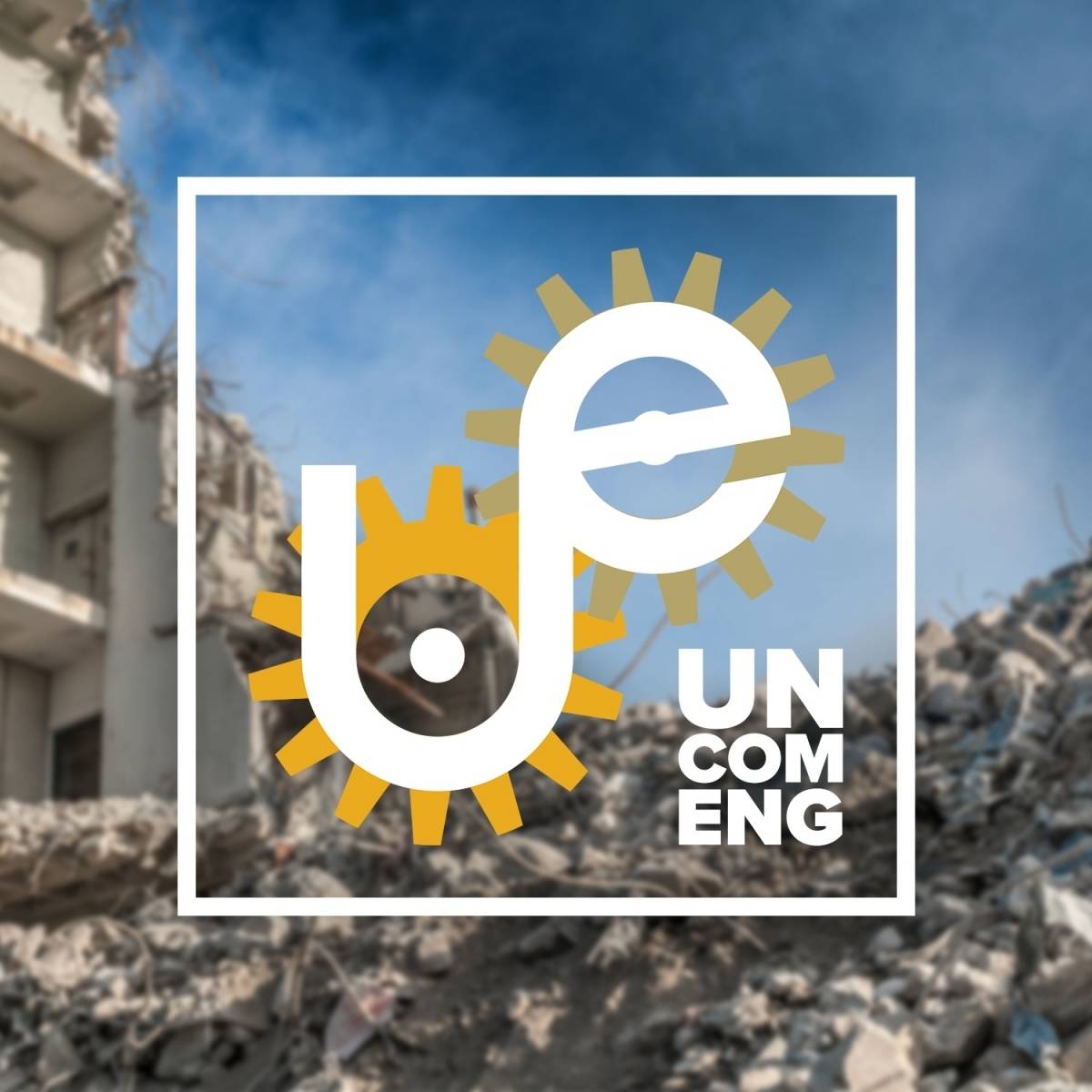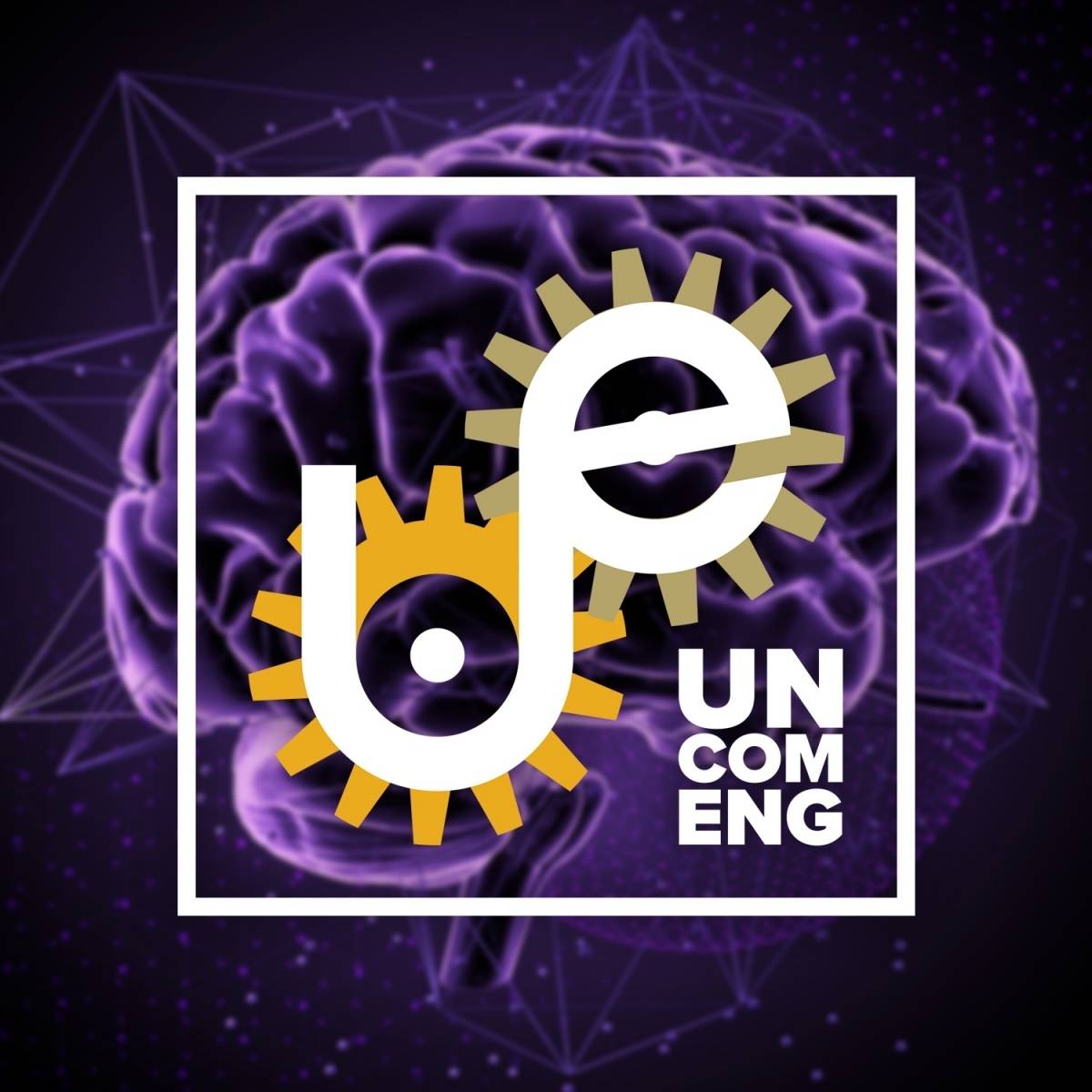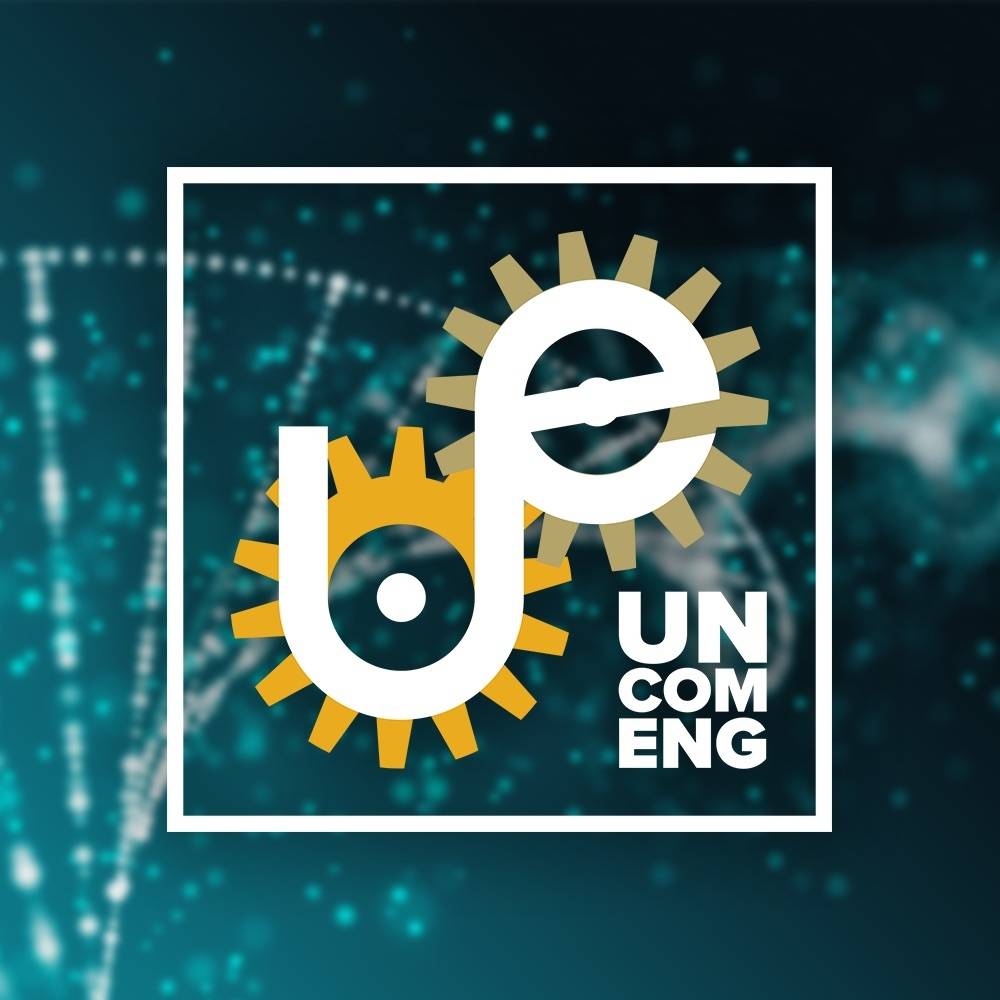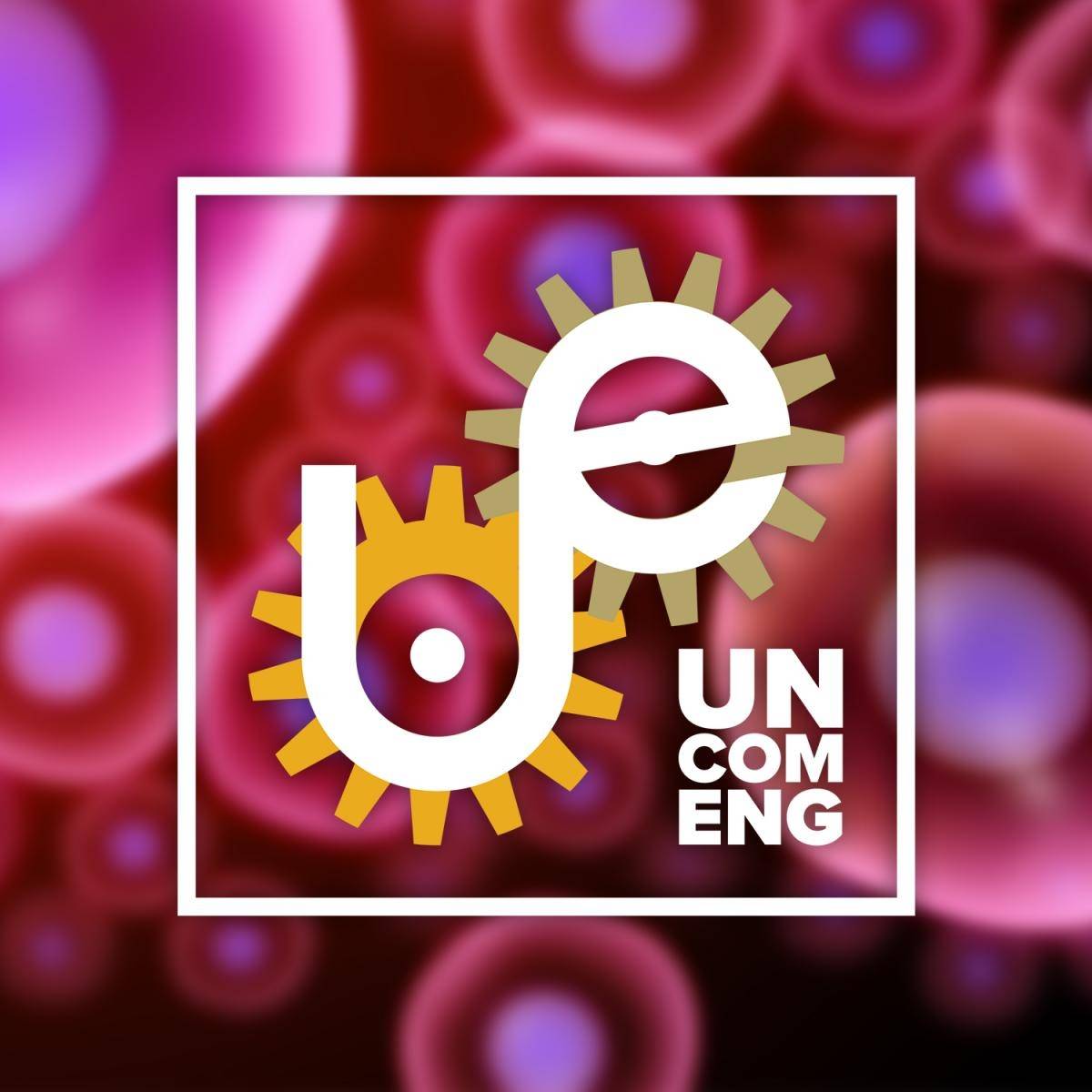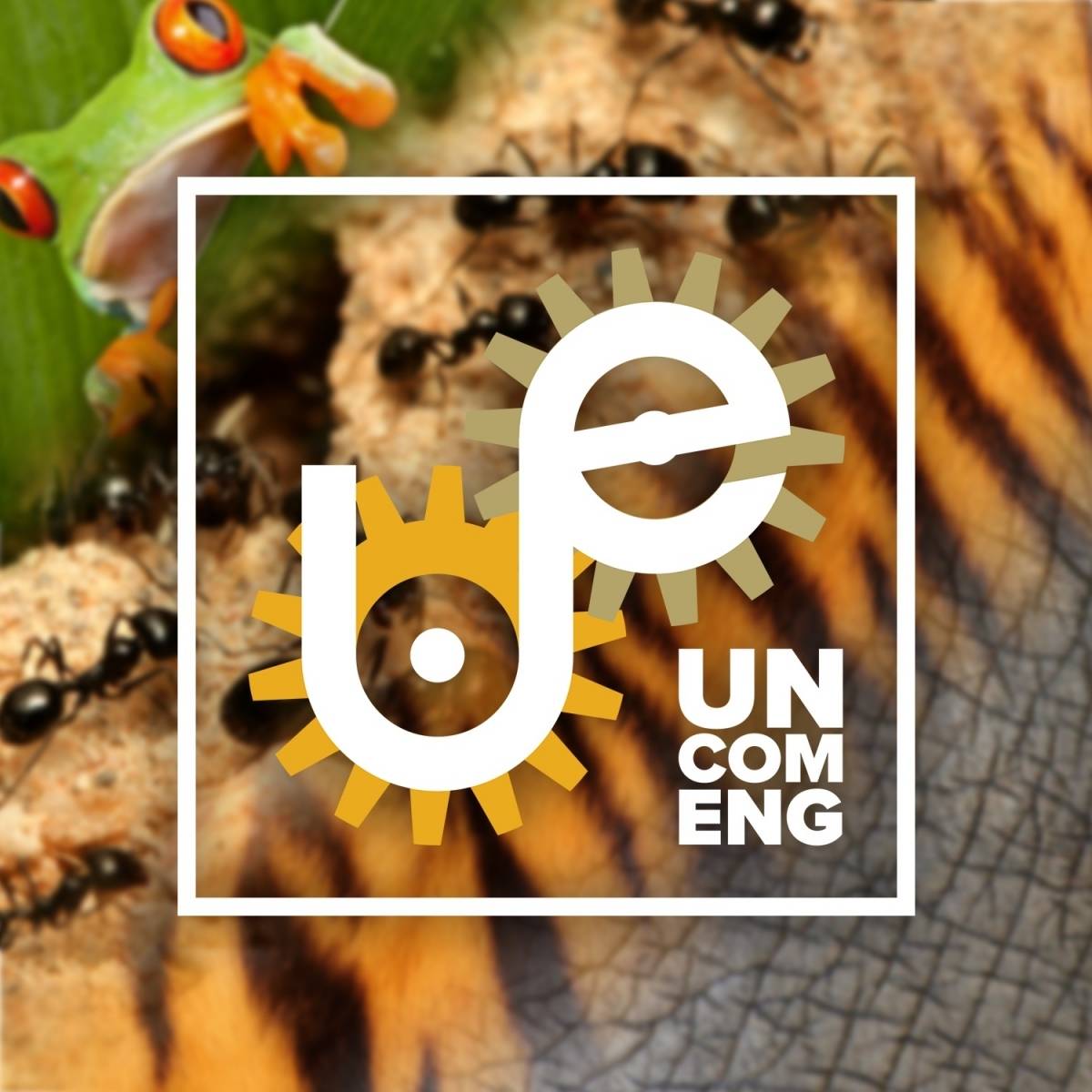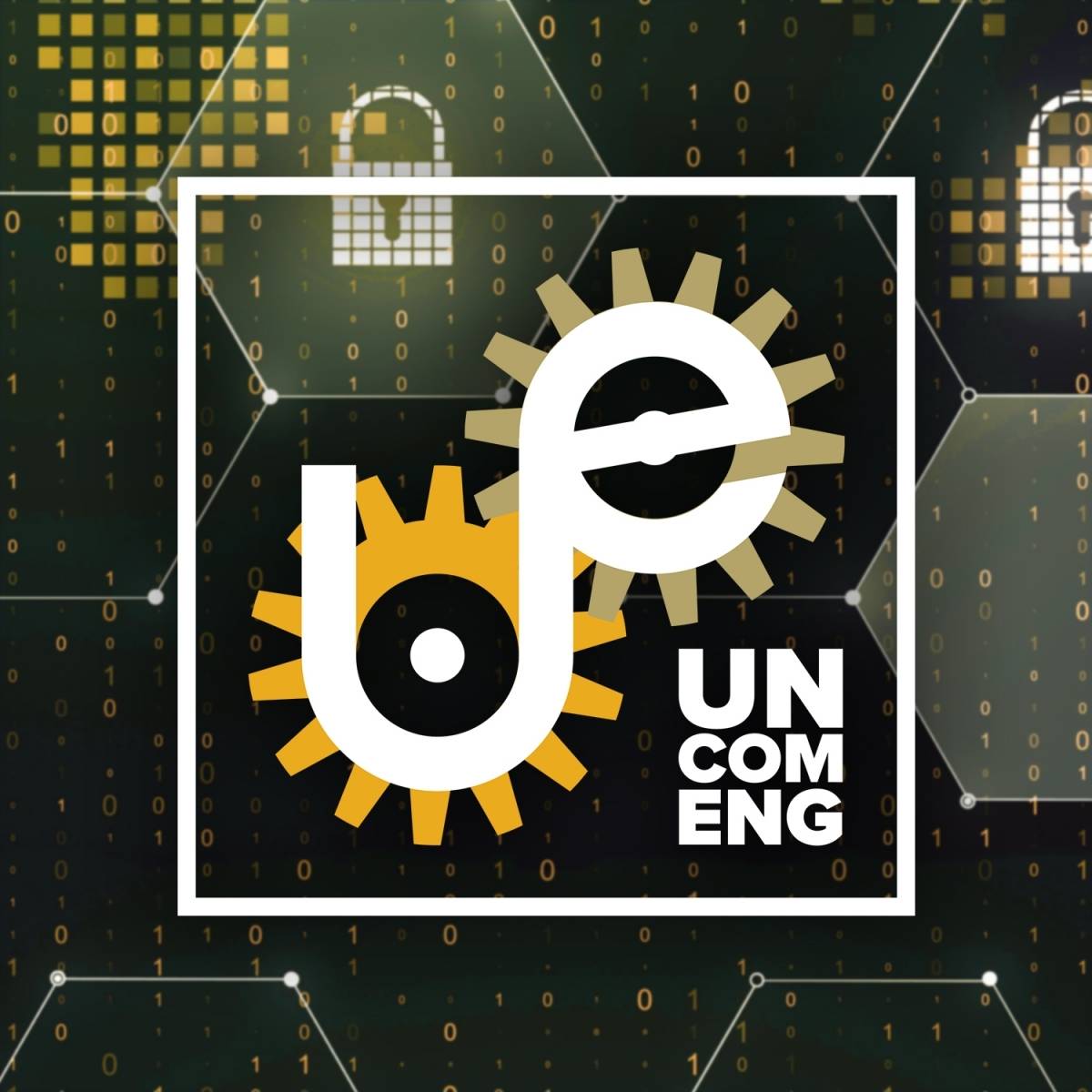
Steve W. McLaughlin
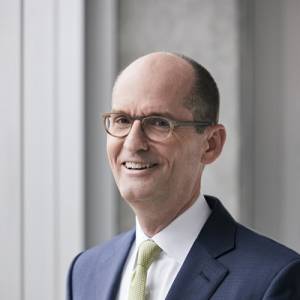
Raheem Beyah
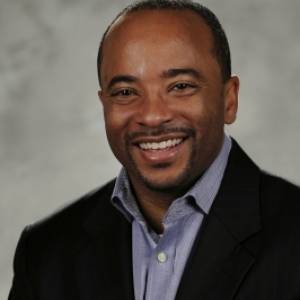
Audio
Audio & Captions
Transcript
[suspenseful music]
Steve McLaughlin: Interdisciplinary is a word that you hear all the time to describe research and education at universities; interdisciplinary as it relates to research, as it applies to educational programs, and to the kinds of faculty, students, and staff that we bring to the university.
[steam whistle]
[applause]
[marching band music]
This is The Uncommon Engineer.
♪♪
Man: [archival recording] We’re just absolutely pleased as punch to have you with us. Please say a few words.
[applause]
Steve: Our guest today on The Uncommon Engineer podcast is Professor Raheem Beyah, Vice President for Interdisciplinary Research here at Georgia Tech. He's also the executive director of the online master's program in cybersecurity, as well as a professor in the School of Electrical and Computer Engineering. Welcome to the program, Raheem.
Raheem Beyah: Thanks for having me, Steve.
Steve: You know, I think our audience— a lot of our audience has some familiarity with research, with the research that's done at universities. But before we dig into interdisciplinary research, can you describe kind of the high-level, you know, ecosystem for research at Georgia Tech and universities like Georgia Tech, why we do it, and how important it is to our mission?
Raheem: Yeah, absolutely. I remember when I first started working on my PhD and I was curious. I had no clue what this whole concept of research was. And as I started to dig in, I appreciated that, really, it was having the opportunity to go and try to discover what was next— the new and many different fields from, you know, computer science to electrical engineering to computer engineering and manufacturing— it's how do we, in a creative way, think about different ways of doing things. And as you get a PhD, you're actually inventing something that's new that didn't exist before; that's essentially the criteria. So that's the high-level overview of research.
And another way to think about it is as that we all play a small part in advancing technology. And so what you'll do is you'll have researchers that will have discoveries, they’ll write papers, and then the next group of researchers will build upon that. And then, you know, years later, you'll have something called the Internet, for example, or you have smartphones or you have satellites or you have new vaccines and stuff. So it's really a community that builds upon itself. And ultimately, the goal is to improve the human condition in some fashion or another.
At Georgia Tech, we conduct research as one of our sort of major thrusts, and we also have the Georgia Tech Research Institute underneath the Georgia Tech umbrella in addition to the resident instruction side. And the resident instruction side is really more of the professors that people know. And GTRI, the Georgia Tech Research Institute, they focus on applied research, which is getting it to the end user a lot quicker— the discoveries— than fundamental research. And we do over a billion dollars of research at Georgia Tech, which is pretty doggone significant. And in the last 10 years, we've actually about doubled the amount of research that we've done here on our campus, which is a big, big deal. It's so important because part of what it does is, you know, we are entrusted with resources from the state, from the federal government and from companies, and it's nice to be able to demonstrate a return on that and ultimately push something back into the community and into society. And interdisciplinary research is essentially exactly what it what it sounds like in that it's multiple fields, or individuals from multiple fields, you know, coming together to solve various types of usually big, big problems where you really need different brains, a diversity of thought across different fields to solve big problems. Here at Georgia Tech, we have the concept of interdisciplinary research institutes, and we also have this concept of interdisciplinary research centers. And I'll talk about those just a little.
So interdisciplinary research centers are really more grassroots-type centers that we’re bottom up where faculty members say, “Hey, this is something that’s really interesting,” and then they usually will partner with a college and maybe the EVPR’s office and develop a center and work on certain things. So we have various types of those. So one example is machine learning center that's inside of the Klaus Computing.
And then we also have these interdisciplinary research institutes, and those are really top down, if you will, and they're much more aligned with the institute's mission. And there are 11 different interdisciplinary research institutes, so there are executive directors that lead these institutes. And this goes from cybersecurity institutes to manufacturing to biosciences. But again, these are fields that cut across many different disciplines.
Steve: We know so much of the research that I think the public thinks about is, you know, research in physics and research in chemistry or in engineering, and I think I tend to think of that as disciplinary research. And so can you say a little bit more about the kinds of interdisciplinary research that goes on at a place like Georgia Tech, like, you know, examples of who comes together and why is it so important that the interdisciplinary nature is essential to the research mission?
Raheem: Absolutely. So that's a great question and there are lots of examples. And what we're seeing, actually, is folks starting to converge into interdisciplinary research. I mean, we're trying to nudge individuals. What people, as you get to the bigger problems, you really need a bunch of different folks with different angles. So one example is actually the work that I do, which is cyber-physical systems security. And what that means is, you know, you have to understand that, let's say, the engineering of a system, so you need a sort of an engineering background depending on what type of system it is. Maybe it's a, let's say, a manufacturing plant, for example, so you need to understand the engineering of the process itself or, yeah, let's just stick with that example. But then there's also software associated with this system. So that's really more of a computer science or computing-type deal, so that's a nice integration of, you know, you need multiple people that can understand the computing piece as well as an engineering piece to not just say, “Hey, my system was breached,” but, “What I want to understand is what happens to the physical system if a breach occurs. Does this completely compromise my process?” And that's the engineering and the controls associated with it. So that's one example.
You also have, you know, biomanufacturing, for example, which is really hot right now, and that is, you know, manufacturing these various biological components. And to do that, you need expertise in manufacturing and you also need expertise in biosciences. And again, when these folks come together, then they can produce really interesting work.
AI is another example which sort of just crosscuts everything. I mean, from research also to education where you would need probably somebody that understands the computing aspects of AI, but you can also apply that to materials science and use AI to create better material. So there's lots of examples I could continue to go on.
Steve: So your role as the Vice President for Interdisciplinary Research just sounds super exciting from the standpoint of you must be exposed to and get to see, almost on a daily basis, really, really exciting new ideas that our faculty or the GTRI is working on. Can you go through a couple of things that are particularly catching your eye as maybe the next explosive areas for research?
Raheem: Absolutely. So I get lots of folks coming to talk to me about great ideas, which is awesome. The negative part is that we can't fund them all, so that's kind of sad. But I really enjoy talking to folks. And, you know, AI is one of the areas that, you know, folks come in from all over campus, which is great, I mean, from Scheller to College of Sciences and everything in between talking about AI and just how it will evolve and how it will be applied to a bunch of different areas. Another really hot area right now that's important to the nation and important to us as additive manufacturing and just how that will change the game in a number of different areas. Biomanufacturing is another area that’s important as well as quantum. Quantum is from the quantum physics piece all the way to the quantum computing piece. So it's really, you know, the physicists to the computer scientists, right. It's all sort of full stack-type of area. So those are areas— and there are a number of others that, you know, certainly I know we'll be investing in as well as many of our peers.
Steve: And I know that— I mean, we're recording this right in the midst of the of the COVID-19 coronavirus spread of the pandemic. And can you talk about how you mentioned a little bit before how some of our corporate sponsors maybe pulled back a little bit, you know, as things became more uncertain for them, but can you talk about what happened over the last five or six months to the research enterprise and where is it headed? How has COVID affected the research enterprise?
Raheem: Yeah. So one thing that's really neat is our faculty, our staff, our students are amazing and extremely resilient. And, you know, our research productivity, we're actually up double digits from the previous year at the same time. So thankfully, the research enterprise is humming and folks have been extremely productive. I assume that they're using the time that they got back from commuting in Atlanta traffic to write proposals. But we've been very successful. The enterprise is going, is doing, really well.
Another nice piece is we in the EVPR’s office, we did these COVID seed grants. And so in order to say, “Hey, this is an area that's important; some of the things should address immediate response, things like PPE.” But we also want to go off and think about, you know, let’s study this 15 years, 20 years, 30 years from now. So the EVPR’s office and— I say in conjunction with GTRI, but GTRI at Tech was part of the EVPR— actually launched this call for COVID seed grants. So we have active seed grants right now from GTRI, College of Sciences, the CoE, the College of Computing, Scheller, and Ivan Allen. So all the way across campus, people are responding to our current crisis.
Steve: Can you say a little bit about some of those projects? I know it's always a— you never like to pick out one or two of the favorite projects, but you're right, it seems like the campus responded so quickly to the virus and contributed in so many ways. Are there are a couple of things in there that that stick out in terms of that rapid response and rapid impact?
Raheem: Yeah, well, there are a lot I mean, certainly very familiar with the work that was done by the many folks over in ME in terms of PPE response in partnership with GCMI, the Georgia Center for Medical Innovation. But we also had folks like, you know, that are outside of the CoE, like M.G. Finn, for example, in Chemistry and all the sort of reagent creation and disinfectant testing and all the work that he's doing. We also had some work on looking at sort of capturing the virus in aerosols, you know, in the aerosols and being able to actually capture it and determine that it is there. And there are folks that are pivoting to see if they can not only capture this and detect, but can recreate various systems to actually disinfect and kill the virus. So lots of really interesting projects that are there; again, sort of rapid response as well as the long-term response.
Steve: So do we have any faculty working on COVID-19 therapies, even, you know, far-in-advance kinds of work?
Raheem: Oh, absolutely. You know, one that comes to mind is one of our colleagues, Phil Santangelo in Biomedical Engineering, and he has been awarded a really significant DARPA grant to accelerate some of the sort of respiratory therapeutics that— actually he's pivoting from another area and apply it to COVID-19, but it looks extremely promising. And I know that that DARPA's interested in him getting that work out as soon as possible, so folks are working around the clock in that space.
Steve: So one of the other things that I think a lot of folks have heard about as being affected by the pandemic are international students. And we do have international students that come to our campus to study for both undergrad and graduate programs. Can you talk a little bit about, first of all, you know, the role of the international students that we have on campus and how this has affected their research or their ability to come to campus?
Raheem: Sure. The international students— and I'll just sort of just speak for me personally and then make a broader statement— the international students have been amazing for me; my students that were international students that were graduate students. There's just no way in the world I would be as successful as I am now without the hard work of many of my students, and the vast majority have been international students. I think if we sort of make— if we look and make a more broad statement, the majority of our graduate students are international students and they are, if you will, the research or the engineering engine of higher ed. And I think any opportunity to reduce those students will directly have an effect on our research enterprise, as well as the research enterprise of other institutions. So I've had the opportunity to really spend time with my international students, my current graduate students that are from other countries really just, you know, just taking the pulse because they're just so much sort of chatter that's going on with the international students. And, you know, what's been concerning me is that they're very worried about their ability to stay in the country, and so what I've been doing, just on a personal note, is just making sure that they know that they have my support, and I really appreciate what they're doing. I mean, the work that my students do, I'm amazed by it. Every time I have a conversation with my students, they talk about, you know, really interesting topics and they advance research and sometimes in ways I didn't even envision that it would go.
Steve: I know that, and you're right. There is a lot of discussion in, you know, in the popular media about whether too many international students are coming to universities. You know, for us at the undergraduate level, only 10 percent of our students come internationally. But as you point out, for the graduate students, for master’s and PhD students, we do have around 50 percent of those students. And I agree with you— they have been the heart and soul of not only our research enterprise, but those students do stay. The vast majority of them stay and they go work for companies and they do startups and they're just incredibly rich and an important part. So, you know, probably like you were hoping that, you know, that as the pandemic passes, those students that aren't able to get into the U.S. right now, you know, will be able to make their way to campus.
Raheem: Yeah. Another quick anecdote on the international student piece, you know, and certainly you don't, you know, you don't expect a return as when you take in students, but, you know, you fast forward now, I accepted an international student, I don't know, maybe seven years ago. He's now a professor in China at one of the top schools, but he's been reaching out to me to check on me, to see if I'm doing I'm doing well and actually sending me PPE for my mom, you know. So it's, you know, so it's so much more than like you mentioned, the research enterprise. The folks I've dealt with have been good people, and they've, you know, one of the best decisions I made seven years ago was to accept that student, and now he's checking and worried about my health.
Steve: Yeah, they’re bridge builders, right? You know, some in the popular press say, you know, they're stealing ideas, but the reality is the vast majority of them are actually bridge building, some in research and some in personal ways that you just described. So that's really, that's great to hear.
Well, one of the things that we always do on The Uncommon Engineer, is we talk about your path— your path to engineering, your path to being a professor, because so many folks have different ways of finding their way to what you do for a living. Can you talk a little bit about how you got interested in engineering and some of the key moments getting to where you are today?
Raheem. Sure, happy to do that. So I, as a as a kid— and I have to be careful with my own son, and it’ll make sense in a minute— but as a kid, I was very into video games, and it's the one thing that I keep telling my son to put down now, but I was so into video games. And I think my grandmother got me an Atari 2600 when it came out. It just changed my world. I mean, it's like, “Oh, my God! This is amazing!” I was maybe 7 or so. And as I continued to play these video games, I started wondering, you know, you’ll get to different parts and start questioning these parts. Well, why can't I do this? Well, this is only the path. It’d to be really great if I can do these other things. And that got me to this whole concept of programing, in that it has a computer program and if you could if you could modify the program, then you could have these alternate paths that you would like. And so I really started going down a path of computer science and computer engineering, you know, starting from these actual video games. And as I got to high school, I realized that I was actually really good in math and science, and I really enjoyed math. I mean, I would just sit and, you know, work all the extra credit problems and all the difficult problems. And, you know, it's funny, I would go to these various study sessions, and I never thought I would actually teach or be a professor, but maybe this is sort of this thing that happened many years ago, this foreshadowing. But I would go just to teach my colleagues. I knew all the stuff to teach all my friends, but I would always go because I was really good at explaining the material. So, you know, just fast forward with some good advisers, as you know, I'm a very proud graduate of Atlanta Public School System, Frederick Douglass High School, so I had an amazing calculus teacher, Miss Mills, and then also other advisers. And at that point, I didn't really know what an engineer was or an engineer did, but I explained, like, “Here's my interest. I'm interested in computing,” you know, “from a hardware and software perspective and also have this strength in math and science.”
And fortunately, they said, “Hey, well you should be an engineer.”
And I'm like, “What is that?”
And it was like, “Well, these folks, they solve these problems in certain domains. And you have this background and interest, and you should be an engineer, maybe a computer engineer or electrical engineer.”
And I said, “OK, well, sure. I'll do that.”
So I went to undergrad at North Carolina A&T University. I wanted to leave Atlanta, and I applied to one graduate school, which is yet another dumb thing that I've done in my life, even though I think we are the best. I always encourage folks to go look around, you know, we're very confident that you'll come back. But fortunately, I was accepted to graduate school here at Georgia Tech, and did master’s and PhD. And, you know, as I finished my PhD, I started trying to figure out— and I should have done this earlier— what I wanted to do with my life and career. My adviser John Copeland really grew up in industry, and so he didn't get to Tech until the mid-50s as a professor. So a lot of our work was very industry-focused; a lot of contracts were industry-focused, and so I was thinking I would go in that direction. And after I finished my PhD, I worked as a research engineer and still trying to figure out what I was going to do with my life. And so here is a nice turning point that got me really thinking about academia— I ended up teaching a class in computer science at Georgia State. I was a research engineer, so I was kind of managing my adviser’s group. And then the other piece that's really important, I was running a diversity program. So I was running the focus— I'm sorry— the FACES diversity program started by Gary May many years ago. And I said, well, wait a minute, this is probably what I would be doing as a professor. I would probably be teaching. I would be conducting research. I’ll be probably doing some sort of diversity initiative. And that's what got me thinking about academia. So I took two-years gap between PhD and started my first faculty position.
Steve: Well, I really would like to hear more about your interests, the things that you're doing with regard to the diversity in STEM education. And I know you went to an HBCU, North Carolina A&T, and made your way to Georgia Tech and got involved in some diversity initiatives here. Can you talk about both how important it is to you personally and how important it is to the Institution and, more importantly, the kinds of things that we should be thinking about to make sure that the Georgia Tech campus more represents the demographics of the city of Atlanta and the state of Georgia?
Raheem: Yeah, happy to do that. I have— diversity has been a passion of mine for many years and, you know, I have probably over two decades of experience leading programs or building programs or being advisers for programs. And, you know, it really starts from lots of informal and formal mentoring. I've probably participated in hundreds of those sessions and panel discussions and presentations and such all the way to actually building programs, right. So I've, you know, I've built a program, started an organization along with Sam Graham and Bara Cola, a chair of ME and a professor in ME called Academic Research and Leadership Network. And the goal of that organization is to really increase the diversity in STEM inside of academia. So we have hundreds of PhDs and near-PhDs. that are that are part of this group, so I really have had a rich experience. And a big part of it is— and especially the mentoring piece— is there's no way in the world I would be where I am without, you know, a number of different mentors that I could go and just knock on the door and say, “Hey, you know, this thing happened. How do I respond?” And so that to me is really important. And also I've just seen that, you know, the difference between people succeeding and not is just they didn't have access to a mentor or information, so I try my best to do that.
I think we have to, you know, the data makes it very clear that having diverse teams gives you just a better outcome in pretty much anything we do, and that's all aspects of diversity. You know, most of my work has been in sort of ethnic and racial diversity, partly because that's where one of the major needs is and that's where my expertise is, but in general, it makes sense to have a very diverse group or diverse crop of folks so you can look at problems in a different way, and then have the absolute best outcome. So as we move forward at Georgia Tech, I think we've actually made a good bit of progress. If you look at sort of African-Americans in leadership at Georgia Tech is something that I think we should be very proud of, and we should understand like how it happened because, you know, you start thinking about things that are structural in a negative way, I would argue that this may be structural in a positive way. So it would be really interesting to figure out how this sort of thing happened, because we are much better than many places. We've done a much better job of having more women engineers, more Hispanic engineers, and I think, you know, we just have to continue. And, you know, I've
consistently told folks that for diversity we just have to be intentional about it and in an uncompromising way. And so even when times like COVID hit and you have budget constraints, we have to say this is critical to our mission like everything else, and we just have to stay with it. So there's actually lots of low-hanging fruit that can be done to maintain and even improve our diversity on campus. And it's not fix the pipeline. The pipeline certainly is not where it needs to be, but there's so many things that we can do before we even get to the pipeline. And I like to say, you know, we need a moonshot, but that's not necessarily an innovation; it's actually just being intentional about it. And by the time we are doing the things that are the low-hanging fruit, by the time we exhaust that, you know, we would have fixed the pipeline, and that's down the line. So I think we have a lot of really well-intentioned folks that are very interested in diversity here on our campus. I've had, you know, on average a really positive experience here and from especially from my colleagues in ECE. And some, unfortunately, across the country, that's not the norm. And so my goal is to try to make sure that people have the similar experience that I had as a colleague and a faculty member in ECE.
Steve: That's fantastic to hear, and it really is incredibly important, not only the present Georgia Tech, but to the future Georgia Tech that that we make because I think in some ways some of the things that you talked about is making sure that Georgia Tech is the most welcoming place. It is about pipeline. It is about, you know, the things that we can do, but I think making it the most welcoming place, not just for black students, not just for our Hispanic students, but for all students and faculty. So I can't thank you enough for everything that you're doing to make a huge difference on those fronts.
Well, Raheem, it's been fantastic to have you here on The Uncommon Engineer today. We talked about three of your hats; I have a feeling you have a couple more. But the contributions you're making in terms of interdisciplinary research, the online master's program in cybersecurity, and to your diversity efforts in engineering and STEM more broadly, and in some ways, there's almost nothing you don't do on campus, and so we really, really appreciate all the contributions that you're making. I know we bump into each other all the time and really looking forward to bumping into each other more and more. And I just want to thank you for everything you're doing for our campus, and thanks for coming on The Uncommon Engineer.
Raheem: Great. Yeah, thanks, Steve. It’s been great, and thanks for the invitation. I've enjoyed the discussion.
[marching band music]
Geekout
Audio & Captions
Transcript
[big band swing music]
Steve McLaughlin: You mentioned the Interdisciplinary Research Institutes as kind of being the backbone of Georgia Tech's research strategy. Can you share a little bit more about how they operate; the kind of work that they do?
Raheem Beyah: Absolutely. So the Interdisciplinary Research Institutes, or IRIs, they are headed by an executive director, which is in this case, actually, has always been an academic faculty member. There are associate directors that really come from all over campus and GTRI; so from Ivan Allen, Sciences, GTRI, other colleges. And, you know, what I tasked them to do really are a few things. And this is how I'm sort of indirectly measuring the advancement of the interdisciplinary research mission here on campus. And the first major task is to build community, and that is actually the most challenging task and the most significant task. And the main reason to do that is to be able to go after larger initiatives. You have to have a really a group of researchers that are there on deck and that are willing to be led by this executive director. And the reason that that is a big deal and not easy is because faculty members are pretty much small business owners, and almost everybody is doing just fine by themselves, and you have to convince them that it’s worth coming together and partnering and building this community to go after much larger efforts. So you'll see various types of workshops and various types of new initiatives between different IRIs that they push out to faculty, and the goal really is to build that community.
In addition to that, the next thing that I'm interested in is really the thought leadership. And, you know, we've been saying so much; we've been asking the question really very often about what does Georgia Tech think. And what I'm hoping that that will be answered by our IRIs and the leaders of those IRIs. So I want to cultivate thought leadership. How are we helping our folks from government affairs? Are we doing op-eds? Are we influencing legislation in terms of, you know, the research direction? So what are we doing that's much larger than Georgia Tech and influencing and impacting society on a larger scale?
The other piece is, you know, I've sort of shifted them in a direction of school chairs, at least the chairs that are in engineering, and really encouraged them to be much more entrepreneurial and to build resources for the IRIs. I mean, we all know that we are on a— even pre-COVID we had a very constrained budget, and if we want to do big things, we have to make sure that we can raise our own funds to do some of those things. And that can be from corporate development, but also these large, you know, MRI-type proposals, for example. And then as we think about what's the next interdisciplinary area, right, how do we do that, so I've been encouraging them to work together and do lots of really joint projects. So you can imagine a cybersecurity IRI as an example, really could have sort of, you know, work across all the other IRIs— manufacturing and biosciences and AI and everything, everything else, for example, right? Cybersecurity applies to it, right? So let's get folks talking to each other so that we can create the next new area. That's really important.
And the last area of focus for the IRIs is accelerating technology and transfer and knowledge transfer, so how do we get the stuff that we're doing in a lab. Let's get this out to society and get it out to the community. And that works really well. I'm not sure if you noticed yet, but as of September 1, Technology Licensing reports to me. So it's a nice— you know, I've had calls with sponsors saying, hey, here's a slate of things that we're doing that's really interesting. And by the way, I know I can get this out to you because, again, I'm involved in in multiple areas.
Steve: You know, and maybe writing papers. And now you're talking about the translation, translating that to industry or maybe to a startup company. And yeah, I had heard that the licensing operation now reports to you. Can you talk a little bit about, you know, how that works? When a professor has a good idea or a graduate student has a good idea that's come out of the lab and we really want to license that idea or license that technology either to a startup company or to industry, can you say a little bit about how that actually happens?
Raheem: Absolutely. Yeah, so oftentimes the faculty member will need to figure out is this something that can be protected? Like what type of IP, intellectual property, are they actually generating? And, you know, so the good thing about our Technology Licensing Office is they can help them, as well as VentureLab, which is one of our entrepreneurship units, innovation units. They can help the faculty member really decide, hey, this might be something that one-off, small piece you want to license to an organization, or you may want to build a company around this. And then once you figure out and make that core decision, and let's say you go down the path of licensing it for a startup or at a company, you will need to determine what the technology is and how it should be protected. And one example is that of protecting the idea and using patents. So our faculty members will file these invention disclosures, which will ultimately result into a provisional patent and then ultimately result in a utility patent. We often like to find partners along the way as we go through the process, let's say a company is really interested in the technology, and that way they would help to offset some of the cost, but they get in early on, and they get to see how technology is being developed and matured. But, you know, I think your earlier comment, I completely agree that oftentimes universities are not thought of of pushing technology out. And I think not only is it really important from a technology perspective or a devices and innovation perspective, but I also think it's a way for us to communicate what we're doing here at the university. So I think, you know, what our communicators do in terms of getting the research out and describing it is extremely important. But another way of doing that, in addition to doing it via videos and blogs and such, is to actually push technology out. So people, you know, riding down 85, know that, hey, this widget that's in your car is powered by Georgia Tech, and that lets people know that we're doing things that will impact them in the very near future.
Steve: Well, I know you wear multiple hats, many hats, and one of the other hats that you wear is the executive director of our online master's program in cybersecurity. And, you know, we keep hearing so much about cyber threats, cyberattacks, the need for education in that space. Can you give an overview of how unique our master's program is and share with our audience how exciting that degree program is and that whole area as a whole is?
Raheem: Absolutely. So I've been in this role of executive director of the online master's in cybersecurity about two and a half years now, and we have an interdisciplinary degree, and the approach that we take, I think it's really the appropriate approach because cybersecurity is a big problem, and it's an interdisciplinary problem. So we were hoping to craft a degree program that's also interdisciplinary, such that we can develop these cybersecurity experts to address this interdisciplinary problem. So it has three different tracks, so specializations. One is policy. So that's in the School of Public Policy, run by the School of Public Policy. We also have a cyber-physical systems specialization, which is run by the School of Electrical and Computer Engineering. And then we have the info-sec specialization, which is sort of the traditional cybersecurity, and that's run by the School of Computer Science inside the College of Computing. The program we— the MS in cybersecurity degree actually has been around for about 18 or 19 years. It had a different name, but it's actually been around for a very long time. And about five years ago, it was expanded to be a much more comprehensive degree program. So before it was primarily in the School of Computer Science, and about five years ago, four years ago, we expanded it to have these different specializations, these different tracks. Right now we have— I'm really excited to say we have over 1,000 enrollments and close to 900 students at this point. And we just started this program a year and a half, so it's a really big deal. It’s super exciting. And I imagine in the next few months we'll actually cross the 1,000-student threshold.
Steve: And can you talk about the typical student, since it's an online program? Can you talk about the typical students? Are they real Georgia Tech students? Are they on our campus? What's a typical student look like?
Raheem: That's a great question. So the students are so diverse that they're— there’s nothing typical about them, which is good. I think that's a wonderful thing. So we have students that the age range, you know, I think this lower bound is right is like 16 or something— this is a master's program— up to late 50s, right. It’s like wow. Dozens of countries are represented. The average age is about mid-30s, right, so that's very different than our on-campus master's program. And many of them have master's degrees already. Several have doctorates that are coming back to do this master’s. These students are absolutely, 100-percent Georgia Tech students, which actually you can, you know, as evidenced by, you know, now in the pandemic, I haven't been on campus in a long time, but I'm sure I am a Georgia Tech faculty member. But, you know, those students are great. And what's nice about the program is, you know, people ask me, how does it compare to on-campus? And number one, it is the same curriculum. And so when you think about and just sort of take a step back and how these different programs are created, the faculty essentially own, if you will, the curriculum. And they come up with, you know, what makes sense and within various constraints for this degree. But then there are different ways in which a degree can be offered, right? So, you know, one can offer it on campus face-to-face, which is kind of what I had for my degrees. You know, we have also done what's called a hosted model where we have faculty members will fly out to various companies and teach a cohort of students. And then we have this online sort of asynchronous mode that we have now where the lectures are recorded, sort of prerecorded, and then you have lots of interaction through Piazza, which is a sort of blog-type, interactive blog-type system, and you have sort of an army of TAs, if you will. But the important thing is it's one curriculum; it’s the same curriculum that's just offered in different formats, different modalities. It's the same faculty members. So when I was teaching on campus, I would teach Intro to Cyber-Physical System Security on campus and Intro to Cyber-Physical System Security online. It would be the same labs, same projects, same exams. So it's the same degree program and it's actually— it's different. So one example is, you know, you don't have as much, let's say, face-to-face time with a faculty member. That's true, but there's lots of sort of peer-to-peer learning, and that's because in some of the classes you'll see that the professor is not the only expert, which is great. So you'll have people that work in industrial cybersecurity for 15 years or 20 years that are taking my class, so they would be additional experts in the class in addition to the faculty member. So it's the same quality of experience, but it's a different experience.
Steve: Well, I think that, you know, you touched on a number of pieces there. And that's what I keep hearing over and over again, you know, 20 or 30 years ago, people were talking about, you know, online education, you know, remote education, and I think some of those, for lack of a better term, stereotypes still persist. But in the program, the online master's in cybersecurity and our two other ones, I think the sense is that those kind of stereotypes are just being blown up. The quality is very, very high, and the experience that the students get is very, very high. And can you remind me the cost of the online master’s in cybersecurity?
Raheem: Yeah, it's under $10,000 in tuition.
Steve: For one year?
Raheem: No, the entire degree. The entire degree is under $10,000 in tuition. The way it's described— it's described that way because each semester there are like semester fees that kind of add on, right, so the longer you stay, there are these fees that accumulate. But the tuition, in terms of for the credit hours, is under $10,000. So it's, you know, in terms of ROI, in terms of quality for price, you know, it just doesn't— it really doesn't get any better than that. One of the milestones— and I forgot to mention— was this summer we had our first graduate, and I was really excited to talk to him. And by the way, his name is Raheem? I was like, “Oh, this is great!”
[laughter]
“I like you! I like you, buddy!”
But he's actually a Canadian. And I had a chance to do an exit interview, and I asked him, I said, “Look, you know, tell me about the program. Give me the good, bad and ugly.”
The first thing he said was, “It was amazing! It was an amazing experience!” And it was a really, really positive exit interview. So it's a nice milestone for the program.
Steve: Well, the online master's in cybersecurity is obviously, in a short period of time, has become a leading program. And I know that that's leading to other things, thinking even bigger in cybersecurity on campus. And do you want to share— we're recording this at a time when the news is fresh, but I think this will appear at a time when it's a couple of months old. Do you want to share the very recent news about thinking even bigger in cybersecurity?
Raheem: Absolutely. So the field of cybersecurity— and I've been in it for decades now— and what I've observed is— and not just me, but others, and you can actually, as you go to conferences, you see different people coming to conferences and different discussions taking place, which is good. It almost kind of mirrors computer science a few decades ago. But the point is it's becoming so broad. And, you know, from people that have backgrounds in business and economics and computer science and engineering, you know, mechanical engineering, electrical engineering, policy, all these different areas, so what's happening there is it's really becoming its own sort of standalone discipline. It’s kind of graduating. And I think we are recognizing that and trying to get in front of that with this new School of Cybersecurity and Privacy. So I had the opportunity to be on the committee to help at least shape what we would recommend to you and the other two deans that are involved. And it's exciting. And it's people that were from GTRI, policy, and sciences, and math, all these different individuals shaping a very, if you will, different vision of a school that we call the School of Cybersecurity and Privacy. So that— this is in— we're in September, and I think it's going to be announced really soon. But it's a big, big deal, and I imagine that it will— who knows what may happen, but it's one of those areas that, if nurtured correctly, it could be even something even larger than a school. It’s perfect timing because we were also— I think this is the first ranking; I believe this is true of cybersecurity programs— and U.S. News & World Report said that we were tied as number one in the field, so a big deal. It also is nice to kind of get a nice reinforcement that we're doing the right thing. We're standing up this School of Cybersecurity and Privacy, but it's really important. And that's probably the natural home for the online master’s in cybersecurity program. And you can envision, you know, again, as the faculty think about it, you can envision, you know, undergraduate degree programs in this space; certificates. You can envision various centers, for example, that have different themes associated with it. So imagine like a GTRI having a national defense sort of security theme, cybersecurity center that's a part of this new School of Cybersecurity and Privacy. So it’s a big deal, and I kind of see it as our cybersecurity IRI kind of graduating to a school.
Steve: Well, you know, as you were talking about your background and how you got to where it is you are today, at least in in your technical interests, you know, I think you describe yourself as a computer engineer, but we also talked about cybersecurity and your interest there, and a lot of people, I think, think of cybersecurity as the domain for computer scientists. But is there a difference between computer scientists and computer engineers? That one is a big, occasionally messy, kind of a question, but I'm really curious about your take on that.
Raheem: Yeah, no, that's right. And I agree it is messy. So in general, my interests are in computing, which spans, you know, software and hardware. It's its own sort of ecosystem. So when you think about computer engineers, you know, at a high level, you would say, well, these individuals may be a bit more focused on sort of the combination or integration of software and hardware, and oftentimes our computer science colleagues— and I don't mean sound in a negative way because we all kind of make assumptions; that's what we do in engineering— but they there's less focus on the hardware, much more emphasis on the software. So that's kind of how I would separate the two.
And you're right, cybersecurity has traditionally—and this is what I was talking about earlier, about our conferences and how they evolved— they used to be very just computer science-centric— “If any of this database was hacked, then how do you secure it?” But now you'll see that they're looking at securing cyber-physical systems. And whenever you start talking about physical systems, that's engineers; that's engineers. And depending on the physical system is the type of engineer, so it may be an industrial engineer or mechanical engineer. So you really need to understand basically the physics of a process and be able to understand the engineering or the process itself and also the computing aspect. So I think it suits me quite well to be a computer engineer that is sort of sitting on the boundary of, at least in the cybersecurity work that I do, the boundary of the software and the physical system.
[marching band music]

